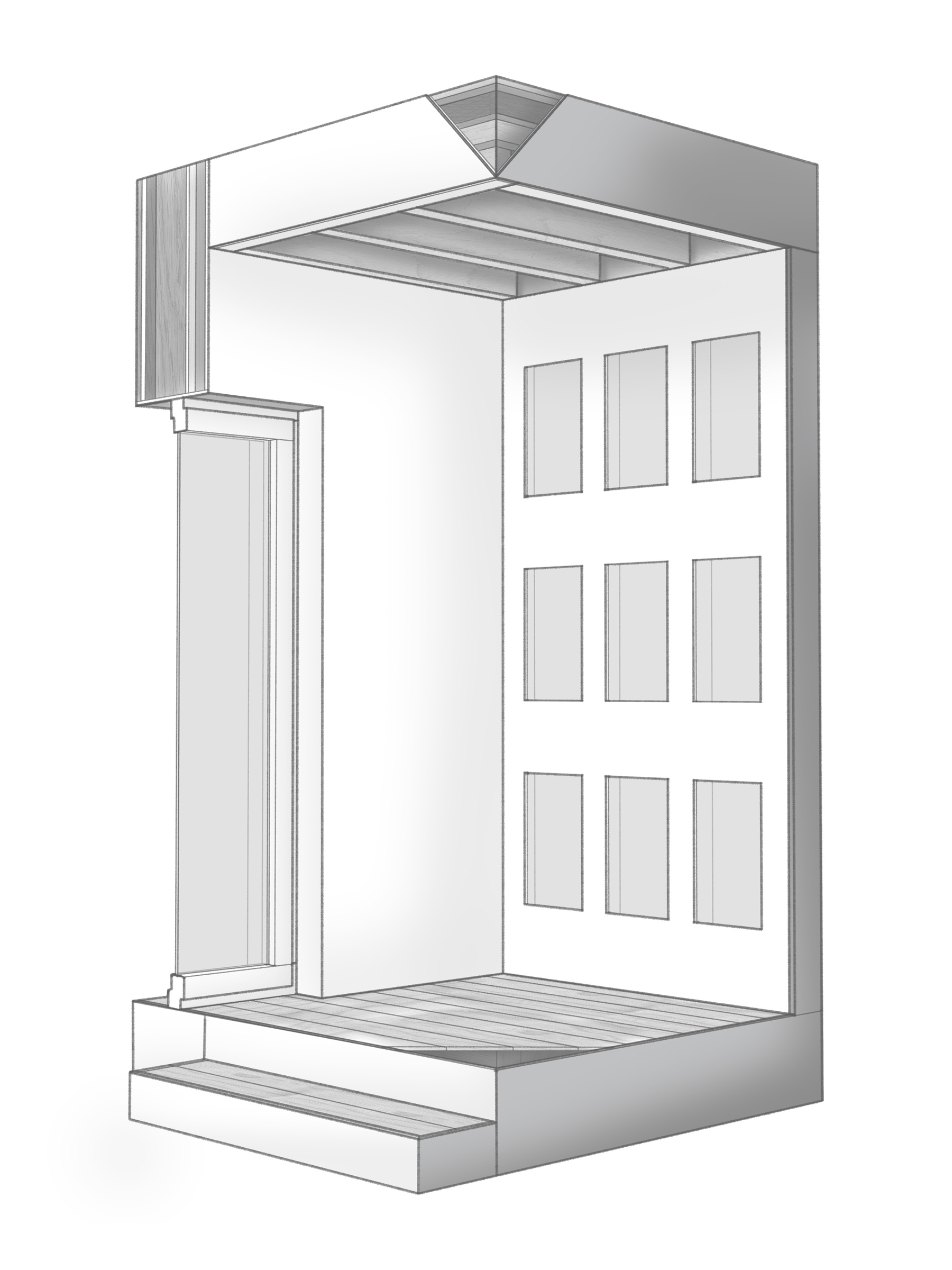
At BAU 2025 in Munich, researchers from the Fraunhofer WKI will be presenting a building construction made from high-quality pine wood components, a wooden beam comprised of reclaimed waste wood, and with insulation materials made from renewable raw materials as well as insulation materials featuring fungal mycelium as an innovative binding agent. With this model, the researchers are demonstrating resource-conserving innovations for building using recycled materials such as waste wood or hemp hurds.
The walls of the building construction consist of pine wood. Houses made from wood are climate-friendly and conserve finite resources such as for the production of concrete or steel. In particular, the construction of multi-story buildings and entire urban districts using timber construction offers great potential with regard to achieving climate-protection targets and strengthening the construction industry with a view to the future. In collaboration with project partners, researchers at the Fraunhofer WKI are, within the scope of the “DiKieHo” project, investigating and optimizing the networking and cooperation of the stakeholders along the “Urban timber construction” value chain. The Berlin-Brandenburg region is thereby being used as an example.
Within the framework of this project, the Fraunhofer WKI is investigating the regionally available pine wood assortments in order to utilize them in the production of high-quality timber-construction elements.
The project partners from the Fraunhofer IPK and the TU Berlin have developed a prototype visualization tool for multi-story timber housing. This tool can be accessed at the exhibit via QR codes and enables the diverse stakeholders within the value chain to determine and visualize various core indicators – such as environmental factors, life-cycle costs, construction duration and construction costs – depending on the raw materials being used. The aim of the project partners is to provide support to metropolitan regions on their way to climate neutrality and to render the German construction industry fit for the future – on the basis of renewable raw materials and closed, efficient resource cycles.
In the walls of the building construction, innovative insulation materials have been installed. The scientists at the Fraunhofer WKI are developing biological adhesives based on fungi, i.e. living, growing organisms. In collaboration with the Braunschweig-based start-up “YcoLabs”, the researchers are using the organic growth of fungal mycelium as a natural binder in order to process plant residues such as hemp hurds, wood shavings or elephant-grass fibers into insulation-material blanks.
By means of a hot-pressing process developed at the WKI, these are subsequently partially compacted, dried and inactivated. As a result, product properties such as compressive strength, fire resistance and stability are significantly improved. One particular advantage is that the insulation materials can be allowed to grow into any desired shape and size. Consequently, they can be used for a wide range of applications.
Conventional insulation materials made from renewable raw materials (German: NawaRo – Nachwachsende Rohstoffe) have also been incorporated into the exhibit. Although these are firmly established on the market and are used in practice, the market penetration of NawaRo insulation materials is currently still low. One obstacle in the past has been the emissions of volatile organic compounds, including odor-relevant substances. Researchers at the Fraunhofer WKI determined in a project that in most cases, the emission behavior of NawaRo insulation materials does not differ from emissions from conventional materials. In the “NawaRo_RedEm” project, in collaboration with industrial partners, measures are also being developed to further reduce the emissions released from NawaRo insulation materials. Today, it is possible to build calculable, durable and safe buildings using natural materials. The materials therefore provide a contribution towards a climate-friendly building transition.
For the building’s construction, the researchers used a decontaminated wooden beam made from bar-shaped waste wood as a load-bearing element. In the “ReFoRe” project, the partners from industry and research are pursuing the goal of utilizing methods for the re-use of wood from ceilings and roof trusses of existing buildings. Existing methods for the preparation and evaluation of waste wood are being expanded and concepts for reutilization are being developed that are oriented towards automated preparation and processing. The key to a significant increase in the re-use rate of wood lies in an improved and considerably faster analysis and targeted processing of the material (in strict compliance with economic and legal constraints). Constructive waste wood has a high material quality and special properties.
Experience it live at BAU 2025!
Researchers from the Fraunhofer WKI will be presenting their innovations relating to the utilization of wood and other renewable raw materials at BAU 2025.
Presentations (German)
Within the framework of the construction-materials theme day, Dr. Jan Gunschera will give a presentation on the Fraunhofer joint stand on the topic of “Emissions of volatile organic compounds from NawaRo insulation materials”:
Tuesday, 14th January 2025 at 11:00 a.m.
Malte Mérono will follow later with a presentation on the topic of “Bonded wood-concrete composite elements”:
Tuesday, 14th January 2025 at 11:40 a.m.
Dr. Henrik-Alexander Christ will give a presentation on “Mycelium-based thermal-insulation materials with optimized properties for the construction industry and other sectors” on the Fraunhofer joint stand:
Wednesday, 15th January 2025 at 11:20 a.m.
“BAU – World’s Leading Trade Fair for Architecture, Materials and Systems”, brings together everyone who is internationally involved in the planning, construction and design of buildings. The trade fair will take place in Munich from the 13th to the 17th of January 2025.
More information about our trade fair appearance can be found here:
We look forward to talking to you!
Source
Fraunhofer-Institute WKI, press release, 2024-12-13.
Supplier
Fraunhofer-Institut für Holzforschung Wilhelm-Klauditz-Institut WKI
Fraunhofer-Institut für Produktionsanlagen und Konstruktionstechnik (IPK)
Technische Universität Berlin
YcoLabs
Share
Renewable Carbon News – Daily Newsletter
Subscribe to our daily email newsletter – the world's leading newsletter on renewable materials and chemicals













